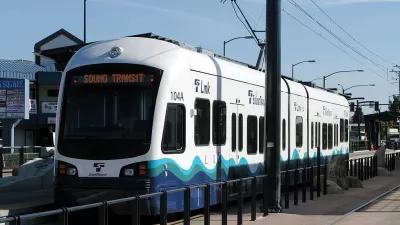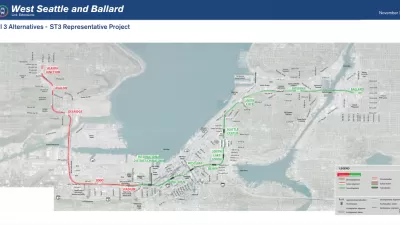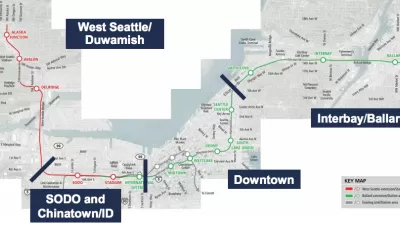Sound Transit is moving forward with a proposed route despite severe cost overruns, throwing other major rail projects into question.

Sound Transit revealed higher-than-expected projected cost overruns for the West Seattle Link Extension project, reports Ryan Packer in The Urbanist, but the Sound Transit board indicated it would continue to support the project without considering alternative options. The project is now estimated to cost as much as $7.1 billion, close to $3 billion more than initial projections.
According to Packer, “Even as the agency touts internal reforms that it says could bring some of these cost increases down to more manageable levels and help Sound Transit regain some ground, there are storm clouds brewing when it comes to the affordability of the entire Sound Transit 3 program.”
Packer outlines other potential options that could save the agency money, such as the Elevated Fauntleroy Way alternative, which could reduce costs by as much as $850 million. But according to Sound Transit CEO Goran Sparrman, “The reality is that the kind of cost escalation we’re seeing on the preferred alignment, that is a largely [sic] driven by broader market forces, so I don’t know that we would expect to see significant lower cost in any other alternatives.”
For Packer, the cost increases pose a broader question about the future of the ST3 program and the Ballard Link project, a ‘sister project’ to the West Seattle extension that could cost $11.2 billion.
FULL STORY: Sound Transit Board Forges Ahead on West Seattle Link Despite Cost Jumps

Alabama: Trump Terminates Settlements for Black Communities Harmed By Raw Sewage
Trump deemed the landmark civil rights agreement “illegal DEI and environmental justice policy.”

Planetizen Federal Action Tracker
A weekly monitor of how Trump’s orders and actions are impacting planners and planning in America.

How Atlanta Built 7,000 Housing Units in 3 Years
The city’s comprehensive, neighborhood-focused housing strategy focuses on identifying properties and land that can be repurposed for housing and encouraging development in underserved neighborhoods.

In Both Crashes and Crime, Public Transportation is Far Safer than Driving
Contrary to popular assumptions, public transportation has far lower crash and crime rates than automobile travel. For safer communities, improve and encourage transit travel.

Report: Zoning Reforms Should Complement Nashville’s Ambitious Transit Plan
Without reform, restrictive zoning codes will limit the impact of the city’s planned transit expansion and could exclude some of the residents who depend on transit the most.

Judge Orders Release of Frozen IRA, IIJA Funding
The decision is a victory for environmental groups who charged that freezing funds for critical infrastructure and disaster response programs caused “real and irreparable harm” to communities.
Urban Design for Planners 1: Software Tools
This six-course series explores essential urban design concepts using open source software and equips planners with the tools they need to participate fully in the urban design process.
Planning for Universal Design
Learn the tools for implementing Universal Design in planning regulations.
Caltrans
Smith Gee Studio
Institute for Housing and Urban Development Studies (IHS)
City of Grandview
Harvard GSD Executive Education
Toledo-Lucas County Plan Commissions
Salt Lake City
NYU Wagner Graduate School of Public Service





























